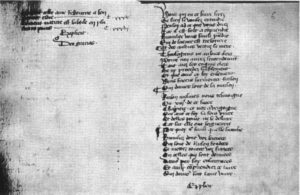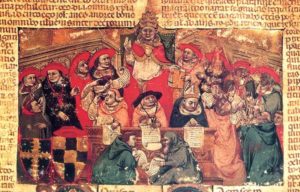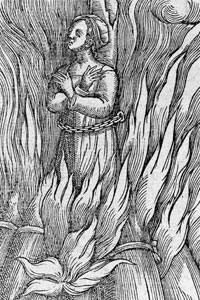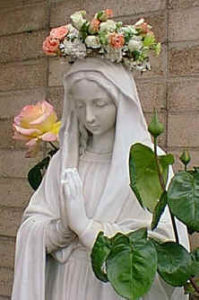Posted in category "Accountability"

“Catholicism is a religion of the head as well as the heart, and to be a Catholic is to commit to dogmas that distinguish our faith from others. Like most religions, it also requires a lifelong struggle to practice that faith day to day. The practice can be difficult. Today’s America is a consumer-driven society filled with endless distractions and temptations for people struggling to live by spiritual as well as material impulses.” – Mario Cuomo, Commonweal Magazine, 2002
Mario Cuomo (1932-2015) was governor of New York from 1983-1994.
An Examen for Ash Wednesday. Have a good Lent.

The National Prayer Breakfast is a Washington, DC tradition that stretches back to 1953, when president Dwight Eisenhower established it at the suggestion of evangelist Billy Graham. It is a bi-partisan event with political, business and civic leaders coming together to pray. Many members of Congress normally attend.
Yesterday’s breakfast had a different vibe. President Trump used the podium to attack supporters of his impeachment drive. “As everybody knows, my family, our great country and your president have been put through a terrible ordeal by some very dishonest and corrupt people,” Trump said. He scolded his opponents by saying impeachment supporters “know what they are doing is wrong, but they put themselves far ahead of our great country.” He added, “I don’t like people who use their faith as justification for doing what they know is wrong.” He went on, “Nor do I like people who say, ‘ I pray for you’ when you know that is not so.” The last jab was directed at House Speaker Nancy Pelosi, who has previously said she prays for him. 
Pelosi responded in a news conference after the event. She told reporters it was “completely inappropriate” for Trump to criticize people for looking to their faith as a basis for their decisions–“especially at a prayer breakfast.” “I pray hard for him because he’s so off the track of our constitution, our values, our country,” she said. “He really needs our prayers.”
I’m not sure all the prayers in the world will help our dysfunctional Congress, and the nasty, pathological liar we have for a president. President Trump is Roy Cohn resurrected.

Bishop Robert Baron, the auxiliary bishop of Los Angeles, and probably the top social media prelate in the world, floated the idea that bishops should consider an official designation for Catholic teachers on social media. He runs the famously successful Word on Fire ministry.
In a January 24, 2020 interview with the National Catholic Register Baron said he believes it is within the scope of a diocesan bishop’s authority to apply a vetting and recognition process for online teachers of the faith, similar to the mechanism Pope St. John Paul II developed in the 1990 apostolic constitution Ex Corde Ecclesiae for colleges and universities.
Bishop Baron called the current era “a golden age of evangelization and apologetics” because the internet makes it much easier to access Catholic content. But be also addressed the downside of social media. “There are, to be blunt,” he said, “a disconcerting number of such people on social media who are trading in hateful, divisive speech, often deeply at odds with the theology of the Church and who are, sadly, having a powerful impact on the people of God.”
In order to stop online misinformation from people or groups claiming to represent what the Church teaches, Barron told the Register that perhaps he and his brother bishops could “introduce something like a mandatum for those who claim to teach the Catholic faith online, whereby a bishop affirms that the person is teaching within the full communion of the Church.” 
This suggestion got an immediate reaction from Michael Voris, 58, who runs St. Michael’s Media and its website, Church Militant. Church Militant is a gossipy, gadfly site with a focus on LGBT issues and personalities, and church officials he doesn’t consider orthodox enough. These include Pope Francis, Cardinal Timothy Dolan of New York, and Voris’ own bishop, Archbishop Allen Henry Vigneron of Detroit. Voris’ homosexual past was made public in 2016. He said he is chaste now.
“Now, the latest Barron insanity and legalism comes in the form of his reportedly saying, while on his ad limina visit to Rome, that U.S. bishops need to come up with some kind of list or plan to tackle what he believes is a serious division of faith,” Voris begins. “That’s rich, coming from a man who shot to instant, celebrity-priest stardom by so nuancing the teaching of the Church on the doctrine of Hell so as to empty it of its content.” 
Voris went on to “out” several bishops that he felt could not be fit as judges of Catholic material. These included Bishop Arthur Serratelli of Patterson, NJ “involved in more gay crap than a gay bar on a Friday night;” and Archbishop Wilton Gregory of Washington, DC. “He certainly knows his way around from his days as Bernadin’s gay frontman,” Voris stormed.
But he saved his worst smack for last.
“Or how about Bp. Barron himself, who almost always has in tow a couple of body-builder producers who still to this day have up all over social media some pictures which leave little to the imagination. Hey, the past is the past, but have you ever told them to take them down now, or is that part of the Word on Fire online presence? What would people think if a priest had female workers who had pictures of themselves from a prior life scantily clad? Why does Barron get a free pass on this?”
Stay tuned!
The chronicler William of Nangis describes the trial and execution of Marguerite Porete, 1310: 
“Around the feast of Pentecost is happened at Paris that a certain pseudo-woman from Hainault, named Marguerite and called ‘la Porete,’ produced a certain book in which, according to the judgement of all the theologians who examined it diligently, many errors and heresies were contained; among which errors (were the beliefs), that the soul can be annihilated in the love of the Creator without censure or conscience or remorse and that it ought to yield to whatever by nature it strives for and desires. This (belief) manifestly rings forth as heresy. Moreover, she did not want to renounce this little book or the errors contained in it, and indeed she even made light of the sentence of excommunication laid on her by the inquisitor of heretical depravity, (who had laid this sentence) because she, although having been lawfully summoned before the bishop, did not want to appear and held out in her hardened malice for a year and more with an obstinate soul. In the end her ideas were exposed in the common field of La Greve through the deliberation of learned men; this was done before clergy and people who had been gathered specially for this purpose, and she was handed over to the secular court. Firmly receiving her into his power, the provost of Paris had her executed the next day by fire. She displayed many signs of penitence, both noble and pious, in her death. For this reason, the faces of many of those who witnessed it were affectionately moved to compassion for her; indeed, the eyes of many were filled with tears.”
Marguerite
Marguerite Porete was a 14th century French mystic who wrote a book entitled “The Mirror of Simple Annihilated Souls and Those Who Only Remain in Will and Desire of Love.” Written during the 1290s, the book was condemned by the French Inquisition as heretical. Marguerite was jailed for a year and a half and asked to recant. When she refused to respond to her inquisitors, she was condemned to death. 
The book provoked controversy, likely because of statements such as “a soul annihilated in the love of the Creator could, and should, grant to nature all that it desires,” which some took to mean that a soul can become one with God and that when in this state it can ignore moral law, it had no need for the Church and its sacraments or code of virtues. This is not what Marguerite taught, since she explained that souls in such a state desired only good and would not be able to sin.
Not much is known about Marguerite’s early life, except that she was born in Hainault in what is now Belgium around 1248 or 1250. She lived during different periods in Valenciennes, Lorraine, Reims and Paris. She seems to have been a stubborn woman, determined to share her ideas despite ecclesiastical censure. I don’t know why she refused to speak to her inquisitors during her trial and captivity. It may have been disdain or defiance, or it may have been to induce a similar helplessness and frustration in her persecutors. She refused to participate in an outcome that they had already decided.
Tina Beattie, professor of Catholic Studies at Roehampton University, London, said: “Little is known about Porete, apart from the record of her trial and what can be gleaned from her writings. It seems likely she was associated with the Beguines, a women’s religious movement which spread across northern Europe during the 13th and 14th centuries. Although the Beguines devoted themselves to charity, chastity and good works, they took no religious vows and their lifestyles varied greatly, from solitary itinerants (of which Porete was likely one) to enclosed communities. The Beguines were part of an era of vigorous spiritual flourishing during the Middle Ages. They were condemned by the Council of Vienne (1311-1312), which also condemned the Free Spirit Movement with which the Beguines were sometimes (and probably erroneously) identified.”
Her Killers – Bishops, Inquisitor, King
Gui de Colle Medio (or de Colmier) was bishop of Cambrai from 1296-1306. He condemned The Mirror and ordered it publicly burned in Marguerite’s presence in Valenciennes. She was ordered not to circulate her ideas or the book again.
The next bishop of Cambrai, Philippe de Marigny, made her life worse. His persecutions combined politics and religion. Philippe Le Portier de Marigny was appointed bishop of Cambrai in 1301 and archbishop of Sens in 1309. His half-brother, Enguerrand de Marigny, Baron Le Portier, was the chamberlain and chief minister to Philip IV, the king of France. Enguerrand was influential in obtaining these appointments for his brother. Philippe de Marigny became an important figure in the trials of the Knights Templar, and in the execution of Templar’s grand master, Jacques de Molay. De Molay was burned alive with three other Templar leaders on a scaffold in front of Notre Dame Cathedral on March 18, 1314. He uttered his famous curse, and both King Philip IV and Pope Clement V followed him to death (and judgement) within a year. The new king of France, Louis X, had Enguerrand de Marigny hanged for sorcery in April 1315. 
Marguerite Porete’s main persecutor and tormenter was the Inquisitor William of Paris, also known as William of Humbert. This Dominican priest and theologian was the confessor to King Philip IV. Appointed Inquisitor in 1303, William also played an important role in the trials and persecution of the Knights Templar. Interestingly, William died in 1314, the same year as Jacques de Molay, King Philip IV and Pope Clement V. Perhaps Molay included him in his curse.
The piety and politics of King Philip IV helped shape the deaths of Marguerite and the Knights Templar. Many of the enemies of the crown were cast as heretics; a convenient label for a self-appointed defender of the Faith. William of Paris supported the political machinations of the French king by suppressing the Knights Templar. The King aided the Dominican’s interests in ridding him of Marguerite—an independent and potentially dangerous religious voice. 
Arrest and Trial
In 1308 William had Marguerite Porete arrested along with a Beghard, Guiard de Cressonessart, who was also put on trial for heresy. Their trial began early in 1310 after they were held in prison in Paris for a year and a half. Under tremendous pressure, de Cressonessart eventually confessed and was found guilty. Marguerite refused to recant, withdraw her book or cooperative with the authorities, refusing to take the oath required by the Inquisitor to proceed with the trial. William was not going to have any easy time proving her a heretic. Marguerite had consulted three church authorities about her writing and gained their approval, including the highly respected Master of Theology Godfrey of Fontaines at the University of Paris. Godfrey’s involvement was an important factor in William’s handling of the trial, requiring him to build his case as carefully as possible. He consulted over 20 theologians—an excessive number–on the question of The Mirror’s orthodoxy. 
Death
On May 31, 1310 William of Paris read out a sentence that declared Marguerite “called Porete,” a beguine from Hainault, to be a relapsed heretic and released her to secular authority for punishment. He ordered all copies of a book she had written to be confiscated. William called her a “pseudo-mulier” (fake woman) and described The Mirror as “filled with errors and heresies.” William next consigned Guiard de Cressonessart, a would-be defender of Marguerite to life imprisonment. Marguerite condemned to be burnt at the stake as a relapsed heretic. On June 1, 1310 Marguerite was burned alive along with a relapsed Jew at the Place de Greve – today the Place de l’Hotel de Ville – in Paris. 
Why Was Marguerite a Target?
There are several possible reasons why so much effort was made to put Marguerite on trial and kill her.
- A growing hostility to the Beguine movement by Franciscans and Dominicans. Beguines were lay religious women who were not under male authority and direction and were outside civic and ecclesiastical structures. In 1311—the year after Marguerite’s death—ecclesiastical officials made several specific connections between Marguerite’s ideas and deeds and the Beguine status in general at the Council of Vienne.
- The popularity of The Mirror of Simple Souls gave Marguerite a prominent profile other lay writers didn’t possess. She also wrote in French, not Latin.
- Marguerite’s perceived association with the Free Spirit Movement or Brethren of the Free Spirit. Free Spirits were not a single movement or school of thought, but they caused great unease among churchman. They were considered heretical because of their antinomian views. One of beliefs some Free Spirits held is that they could not sin by having sexual relations with any person. Extracts of The Mirror of Simple Souls were cited in the bull Ad Nostrum issued by the Council of Vienne to condemn the Free Spirit movement as heretical.
Was there a whiff of homophobia in William of Paris’ denunciation of Marguerite as a “pseudo-woman”?
Marguerite Porete’s era is a mirror to our own. 40 years ago conservative political and religious leaders like President Ronald Regan and Pope John Paul II colluded on major political actions and social change. Lay Catholics began to search for new ways to experience a direct relationship to God. Many of these explorations were condemned since they were outside of traditional structures. The prevailing norms of sexual and gender expression were openly questioned by ordinary people. Sex and sexuality are fraught and fearful topics for the Catholic hierarchy, and many bishops tried their best to suppress them. Their best allies were presidents focused on wealth and expansion. Today, President Trump sounds and acts a lot like King Philip IV.
We can point to one improvement in the last 700 years. We can no longer be burned at the stake. 
Further Reading:
The Beguine, the Angel, and the Inquisitor: The Trials of Marguerite Porete and Guiard of Cressonessart by Sean L. Field
Allegories of Love in Marguerite Porete’s ‘Mirror of Simple Souls’ by Suzanne Kocher
A Companion to Marguerite Porete and the Mirror of Simple Souls by Robert Stauffer and Wendy R. Terry
The World on the End of a Reed by Francesca Caroline Bussey
The Heresy of the Free Spirit in the Later Middle Ages by Robert E. Lerner
Courting Sanctity: Holy Women and the Capetians by Sean L. Field
Transmitting the Memory of a Medieval Heretic: Early Modern French Historians on Marguerite Porete by Danielle C. Dubois
Marguerite Porete: The Mirror of Simple Souls by Ellen Babinsky

According to a study cited in a July 6, 2019 New York Times article, “When ‘Black Lives Matter’ Is Invoked in the Abortion Debate,”black women have the highest abortion rate at 27.1 abortions per 1,000 women compared to 10 per 1,000 white women. Yet, I rarely see black infants in anti-abortion ads. The majority of babies are white.
When I look at news coverage of pro-choice demonstrations, I rarely see groups of black women as part of the marchers or in the leadership vanguard.

Unwanted pregnancy is not the only issue. Economics is a big factor in abortion decisions.
Would conservative white donors to pro-life campaigns use their influence and money to promote economic opportunities for young African-Americans?
Would liberal white donors to pro-choice campaigns use their influence and money to shake up education and teachers unions in predominately black neighborhoods?
Why are pro-choice and pro-life groups so concerned with fetuses, but much less concerned with children?
Dr. Jeff Mirus is the chief commentator for Catholic Culture.org, an online publication that addresses current Catholic issues. While I don’t often agree with his positions, I enjoy his writing and think about what he has to say. I have changed my position on abortion based on reading his articles and those of other Catholic writers over the years. 
Unfortunately, like Catholic writers on the “Left”, conservative Catholics never vary their sermons. They focus almost exclusively on homosexuality, divorce, abortion and liturgies. They rarely bother to address or finger-point on other important Catholic moral issues, like accumulation of wealth and possessions, responsibilities for immigrants and refugees, environmental pollution and the hungry and homeless we encounter every day in our neighborhoods and cities. Jesus did address marriage, but he had a lot more to say about how we need to treat each other, friends and strangers in our midst. According to Jesus, the salvation of our souls depends on two commandments: honoring God and loving our neighbor as ourselves.
In a July 8, 2019 article, Dr. Mirus discusses “Truth and the limits of inclusivity.” “Tolerance and inclusivity are now often used to justify the acceptance of immorality,” he says, “such that the only intolerable groups are those which engage in the precise moral reasoning needed to determine what ought to be “included” (and what is “excluded”), based on a proper understanding of human nature and the common good.” Of course, any reader knows that these are code words and phrases for homosexuality, communion for divorced Catholics and other conservative Catholic bugaboos.
What I miss is the “moral reasoning” by many conservative Catholics when it comes to Catholic/Christian business leaders who pollute or degrade our natural resources and aren’t called to account; partisan Catholic/Christian politicians who don’t act in good faith to help the working poor and destitute; or members of the clergy–bishops, cardinals, and others–who are not exposed as frauds and hypocrites when they preach one morality and live another.
On December 21, 2017 Cardinal Angelo Sodano celebrated the funeral Mass for fugitive Cardinal Bernard Law. Over the protests of many, the Mass was celebrated in St. Peter’s Basilica. In his homily, Sodano said, “unfortunately, each one of us can sometimes lack in fidelity to our mission. That is why, at the beginning of every Mass, we say the ‘Confiteor.’” This prayer begins, “I confess to almighty God and to you, my brothers and sisters, that I have greatly sinned.” 
On December 21, 2019, the same day it was reported that Cardinal Sodano had shielded sexually abusive clergy in the Legion of Christ, Pope Francis accepted the 92-year-old cardinal’s resignation as dean of the College of Cardinals. Pope Francis used the occasion to express “my gratitude, including in the name of the members of the College of Cardinals, for the precious and punctual service he (Cardinal Sodano) has offered as dean for many years with availability, dedication, efficiency and a great ability to organize and coordinate.”
“For some three decades he was the man in the Vatican no one dared cross,” said Robert Mickens, the editor-in-chief of La Croix International. “Even the popes he served were careful to gain his consent because of the loyalty he commanded from any key people at all levels of the Roman Curia.”
In the December 21, 2019 report the Legion of Christ identified 33 priests and 71 seminarians as sex abusers. The report stated that Cardinal Sodano was the one who led efforts to cover up reports of abuse when he served as the Vatican’s Secretary of State. Many of the reports of abuse involved the notorious predator priest, Marcial Maciel Degollago, the founder and director general of the Legion of Christ. Maciel was respected by many within the Vatican, including Pope John Paul II, as a prolific fund raiser and seminarian recruiter. Near the time of his death in 2005 he was publicly revealed to be a thief, drug addict and serial sexual abuser of young men and boys. Marcial maintained sexual relationships with at least two women and fathered six children. He sexually abused two of his sons.
For many decades, Cardinal Sodano’s chief priorities have been power and money. Money from the Legion flowed to Sodano in the form of gifts and honoraria. “Cardinal Sodano was a cheerleader for the Legion,” said one of the ex-Legionaries. “He’d come give a talk at Christmas and they’d give him $10,000.” “It was very clear that Angelo Sodano was going to do everything in his power to protect both Maciel and the Legion of Christ,” said Glenn Favreau, an advocate for ex-Legionaries who was ordained a deacon in the order and worked at its offices in Rome. “Sodano came over with his entire family, 200 of them, for a big meal when he was named cardinal,” recalled Favreau. “And we fed them all. When he became secretary of state there was another celebration.”
His family also benefited from his position and connections. A nephew, Andrea Sodano, was involved in a real estate business with Raffaello Follieri, who was jailed in New York in 2008 on charges of fraud and money-laundering. A major part of his business was buying up church and parish properties at fire sale prices to pay for lawsuits by sex abuse victims. The Follieri Group’s business claimed connections to “senior members of the Vatican hierarchy.” Follieri misused investor funds to pay Andrea Sodano for engineering studies and services he never performed. In exchange, Sodano’s nephew traveled with Follieri to pitch church officials, and gain access to the Vatican grounds, attending a service with the Pope, get his picture taken with the Pope, and arrange for private tours of the Vatican gardens and museum. Marical also hired Andrea Sodano as a building consultant for projects. Legionaires overseeing one project complained to Marciel that Sodano’s work was late and poorly done; they were reluctant to pay his invoices. Marciel yelled at them: “Pay him! You pay him!”
How was Pope Francis finally able to get rid of Sodano? In 2005 Pope Benedict tried and gave up, keeping him as Secretary of State. Were the claws of this rapacious bird finally too weak to tear and rend and hang on any longer? The Legion’s own report finally did the job. 
I can’t shake the image of Cardinal Sodano as a scarlet festooned Don Fanucci, the Black Hand leader in Mario Puzo’s The Godfather and The Godfather Part II movie. Fanucci’s character is based on the personality of Ignazio Lupo, a real-life Black Hand gangster and mafioso specializing in extortion, robbery and murder. “You and your friends should show me some respect,” Fanucci threatened Vito Corleone. “You should let me wet my beak a little…Now don’t refuse me. Understand, paisan? Understand, paisan?…Tell your friends I don’t want a lot. Just enough to wet my beak. Don’t be afraid to tell them!” Fanucci did quite well until the day he threatened somebody tougher. Surprise! He took a bullet to the head.

There is a wealth of Pious Trash in Msgr. Charles Pope’s column, “Church’s Silence Deafens World” published in the National Catholic Register this month. It was a long discourse on the negative effects of tolerating bad behavior in society and in the church as defined by Catholic conservatives, and a major whine on why isn’t the Pope doing something about it!
“The faithful are not discouraged, they are confused and scandalized. Many have been led to think that sins like divorce and remarriage, homosexual acts and idolatry are compatible with the Catholic faith. They are not! Yet some of the most awful things have been done and said by Church leaders (purportedly or definitively) without any clear explanation, let alone attempts at refutation. The silence has been deafening. The enemies of the faith are encouraged while the faithful are disheartened.”
I hope Msgr. Pope is not defining “enemies of the faith” as liberal Catholics, feminist Catholics, lesbian and gay Catholics and our defenders, Catholics who have divorced and remarried, and Catholics who are weary and fed up with legalistic and narrow definitions of “faithful Catholics.” 
By idolatry I assume Msgr. Pope is referring to the wooden carvings of Pachamama, a representation of a naked pregnant Amazonian woman that were displayed and part of some ceremonies during the Amazonian Synod in October. The Pachamama is a female fertility figure venerated as “Mother Earth” by some native peoples in the Amazon region. The woman who presented it to Pope Francis called it “Our Lady of the Amazon.” It is a symbol of Life. Why is this idolatry compared to our church statuary? Most churches and cathedrals in the U.S. have a statue of the Blessed Mother standing on a snake. She is crowned by real or plastic flowers every May. I remember singing when I was a teenager: Bring flow’rs of the fairest, Bring flow’rs of the rarest, From garden and woodland, and hillside and vale; Our full hearts are swelling, Our Glad voices telling, The praise of the loveliest Rose of the Vale. O Mary! We crown thee with blossoms today, Queen of the Angels, Queen of the May, O Mary! we crown thee with blossoms today, Queen of the Angels, Queen of the May. 
The lyrics certainly represent spring and fertility. The ritual of flowers and the observation has its roots in Pagan Europe. In addition, every parish church has a statue of their patron saint. St. Bartholomew holds his skin and a flaying knife; Saint Denis holds his talking head, and St. Lucy holds a plate with her eyeballs. Everyday Catholics are familiar with gruesome martyrdom stories, but I can imagine the wide-eyed reaction from first-time visitors who think displaying such figures is weird, icky or sick. To us it’s not idolatry. It’s an artistic representation that’s part of our heritage.
The ongoing sex abuse crisis has ALL Catholics scandalized. This includes not only the priests and religious that used the young and vulnerable for sexual pleasure and release but the bishops and others in the hierarchy who protected and covered up for them, and in some cases, were abusers themselves. On top of the sex abuse lies and hypocrisy, a second scandal involves the millions and millions in contributions and gifts that were used to fund decadent lifestyles, hush money and settlements that were out of public view. They were protected by opaque accounting practices and careerist clerics who kept their mouths shut.
Are any priests or bishops willing to forfeit their ecclesiastical careers and name names? Release hidden records to newspapers and the local District Attorney? Drag the scum out into the light of day? The silence is deafening from the men who know.
“If we Christians are right in believing that salvation belongs to Jesus Christ, that it does not come from us–and that our hand cannot stop what God allows for us, then yes, there is hope in eternity even for those who take their own lives. Having said that, I think that we must not call what is bad good, what is wrong right. Because we are Christians, we must say what we know is the truth – that taking your own life is against God who made us and against everyone who loves us. Our lives are not our own. They are not ours to do with as we please. God gave us life, and we are to be good stewards of that gift for as long as God permits. The finality of suicide makes this all the worse. You cannot make things right again.” 
Read the whole homily here.
Those comforting, inspiring and hopeful words were spoken by a priest, Fr. Don LaCuesta, at the funeral Mass of a high school student who had committed suicide. Fr. LaCuesta is the pastor of Our Lady of Mount Carmel Catholic Church in Temperance, Michigan. In discussing the service with the priest, the parents had asked that he focus on their son’s life. They also discussed some other arrangements for the service, including having his siblings cover his coffin with the pall.
None of that happened. Instead, the family got blindsided with a lecture about the sinfulness of suicide and its awful consequences. The family, relatives and classmates of the deceased were visibly distraught. Many of them did not know the young man had committed suicide. The father twice approached the pulpit asking the priest to stop the homily, but the priest refused and continued to the end of his sermon.
Since then, the story has received national attention. Archbishop Allen H. Vigneron, publicly reprimanded and sanctioned him. The youth’s mother recently filed a lawsuit against Fr. LaCuesta and the Archdiocese which details their grievances. 
I’m not sure why Catholic conservatives always feel compelled to defend their brethren, even in nonsensical situations. The Catholic World Report recently reprinted a column by Dr. Edward N. Peters about the incident entitled “God Bless Fr. LaCuesta.” Dr. Peter’s comments certainly earned him Honorable Mention in this week’s Pious Trash award.

“When the Catholic novelist closes his own eyes and tries to see with the eyes of the Church, the result is another addition to that large body of pious trash for which we have so long been famous.” Flannery O’Connor, “Catholic Novelists and Their Readers” 1964.
Catholics are subject to a lot of pious trash these days. Most of it comes from EWTN media outlets and Latin Mass participants with their mawkish nostalgia; and U.S. bishops who attempt to justify their discriminatory or self-serving positions. Progressive Catholics, particularly religious, are also responsible for a certain amount of pious trash. This usually comes in the form of goopy sentimentality, or a scolding that applies to everyone, guilty or not. Between both groups I have plenty of material!
A weekly “Pious Trash” quote will be published every Friday.
























